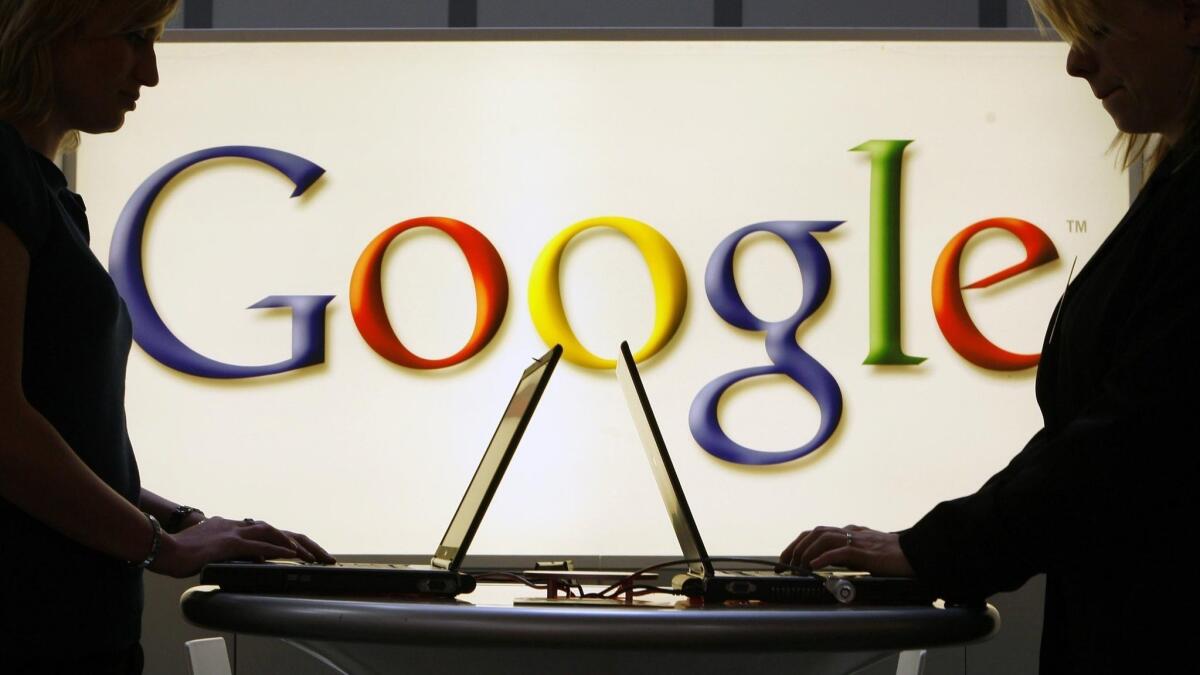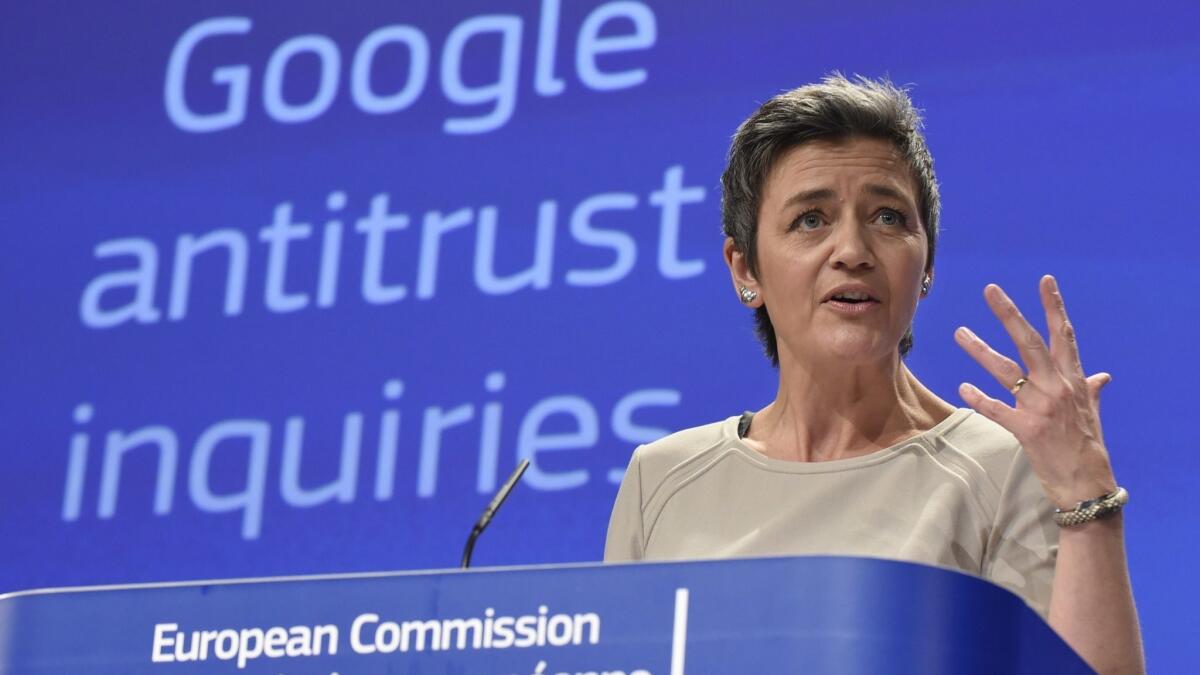Google, facing U.S. antitrust probe, has a battle plan ready from its EU fight

- Share via
Google is facing its first serious antitrust probe from the U.S. since 2013, but years of fending off challenges in the European Union have given the internet giant a playbook to fight such attacks.
The Justice Department is preparing to open an antitrust probe into the Alphabet Inc. unit, according to a person familiar with the matter. Google, with a sprawling empire of businesses that could feasibly be targets, is in the dark about the focus of the investigation and hopes to learn more this week, according to another person familiar with the situation.
Both people spoke on the condition of anonymity, and the company declined to comment on the probe.
Top antitrust officials have agreed to divvy up oversight of the technology giants. The Federal Trade Commission will take responsibility for antitrust probes of Facebook and Amazon, according to people familiar with the matter, while the Justice Department is set to investigate Apple Inc. as well as Google. Meanwhile, the House Judiciary Committee said late Monday that it plans a bipartisan investigation into whether digital platform companies are using their market power to harm competition.
Alphabet’s stock price closed 6% lower Monday, at $1,036.23 a share. Worry that the tech giants are in regulators’ crosshairs pushed the Nasdaq index down 1.6%, and the Nasdaq-100 has now lost 10% since hitting a peak in May.
At stake is Google’s position as one of the most profitable companies in history. Despite the opacity surrounding the U.S. focus, the internet giant already has a well-defined set of arguments for pushing back against antitrust challenges, honed over years of doing battle with regulators, especially the EU.
The EU has brought three major cases against Google, including how it ranked shopping-comparison sites in search results, requirements for how customers use its display ads network, and its practice of requiring phone makers that used its Android software to pre-load those phones with other Google apps.

In arguments to European regulators, statements from executives during congressional hearings and interviews with Google reps, a broad outline of the company’s antitrust defense is already visible:
- Google sees itself as a series of free, accessible and extremely helpful services that enable people around the world to learn information and connect with one another.
- Google says that, unlike Facebook Inc., its core products aren’t trying to get people to spend more time on them in return for questionable social value.
- The company argues that by indexing the web and making its information easily accessible through Google’s search bar, it provides an invaluable service to billions of people around the world — for free.
These assertions, known as a “consumer welfare” argument, have worked for the company in the past. Six years ago, the Federal Trade Commission decided against penalizing Google even though the agency’s staff said the company was unlawfully maintaining a monopoly in search and search advertising.
Google also may consult the playbook it used with the FTC investigation, where the company ramped up lobbying in Washington and funded academics to defend it, said Maurice Stucke, a former Justice Department lawyer who teaches antitrust law at the University of Tennessee. Stucke said, with the latest investigation, Google might say, “We’ve dealt with this in the past, and we got through it. We had a game plan. We can do it this time as well.”
Google has a large or majority market share in several important industries including online advertising, internet browsers, mobile operating systems and e-mail. But the company argues that the global nature of the internet means it doesn’t actually have the power that its critics say it does. Its real competitors are other internet giants, such as Amazon.com Inc. or Tencent Holdings Ltd., the company has said.
One area where U.S. investigators will probably look closely at Google is its role in the online advertising ecosystem. Google sells much of the online real estate available to advertisers, such as search ads and spots that play before YouTube videos. But it also controls the system that many advertisers use to place and track ads on non-Google websites through its DoubleClick unit.
Google will probably point to Amazon’s recent entry into this space as an example of how online advertising is still a competitive market. Amazon said last week it would buy the assets of bankrupt Sizmek Inc., which was a competitor to DoubleClick before it ran into financial trouble.
Google’s share of the online advertising market has also fallen. Though the company still holds the biggest share of U.S. digital advertising spending, its piece of the pie has actually declined to 36.2% this year from 40.8% in 2016, according to research firm eMarketer. Amazon and Facebook are still growing, with 8.8% and 22.1%, respectively.

There’s pressure for antitrust enforcers to shift from the consumer welfare standard. Instead of focusing on whether prices are rising for consumers, advocates for a more robust approach have argued that other factors should play a role in shaping enforcement decisions, such as privacy, control over user data and the ability to discriminate against rivals that depend on their platforms. Their ideas are starting to find a home with politicians on both sides of the political spectrum.
Republican Sen. Josh Hawley has advocated for tougher antitrust scrutiny of the big tech companies since his days as Missouri attorney general. During U.S. Atty. Gen. William Barr’s confirmation hearing in January, Hawley asked Barr to look at the companies in his new role. On the Democratic side, presidential primary candidate and Massachusetts Sen. Elizabeth Warren has said outright she would break up big tech companies including Google if elected in 2020.
“There’s a lot of competition amongst big companies,” Google’s Chief Executive Sundar Pichai told tech news site Axios last year. “For the first time, I think there is more international competition than ever before, and I think that’s going to hold true.”
And because the internet is open, competition is always one click away, the company has argued, adding that if Google stops providing consumers with the best experience, they can easily switch to other products.
If all else fails, Google has shown itself to be more than willing to cut a deal. In Europe, Google agreed to make changes to several of its major products while also paying multibillion-dollar fines. None of those changes have significantly hampered the company’s growth, and the fines barely hurt its stock price. Despite years of aggressive European lawsuits and regulations, Google’s core business of selling advertising based on data it collects on its users has not been disrupted.
Google also has learned some tough lessons. In 2014, the company thought it had a deal with Joaquín Almunia, then EU competition commissioner, over complaints it had unfairly funneled search users to its own products. But Almunia couldn’t get support from others in the European Commission, and the deal fell apart. Almunia’s successor, Danish politician Margrethe Vestager, soon took up the torch, leading to years of investigations and wrangling.
Google’s Kent Walker, then the company’s general counsel, was in the room when the Almunia deal was cut. Now he heads all of Google’s policy and legal work, making him the point person for dealing with the Justice Department’s investigation. It’s unlikely Walker will let the same thing happen twice.
More to Read
Inside the business of entertainment
The Wide Shot brings you news, analysis and insights on everything from streaming wars to production — and what it all means for the future.
You may occasionally receive promotional content from the Los Angeles Times.










